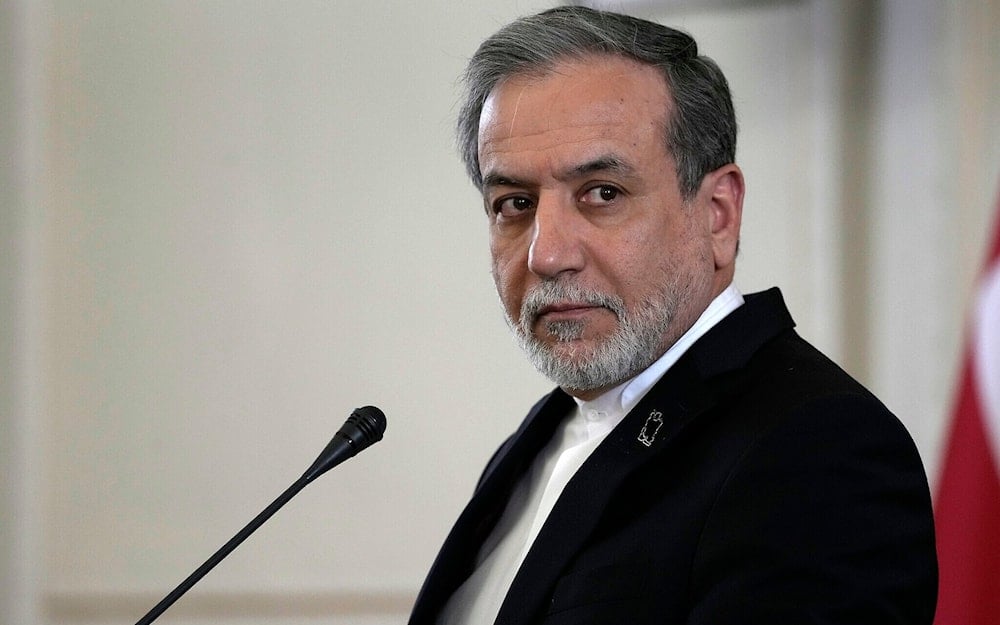Egypt mediates talks to revive Iran-IAEA nuclear cooperation
Egyptian Foreign Minister Badr Abdelatty held talks with Iran’s Abbas Araghchi and IAEA chief Rafael Grossi to promote peaceful dialogue on Iran’s nuclear program.
-

Iranian Foreign Minister Abbas Araghchi at a press conference in Tehran, Iran, December 30, 2024 (AP)
Egyptian Foreign Minister Badr Abdelatty held separate phone conversations on Friday with his Iranian counterpart Abbas Araghchi and International Atomic Energy Agency (IAEA) Director General Rafael Grossi to discuss developments surrounding Iran’s nuclear program and efforts to de-escalate regional tensions.
According to Egyptian media reports, the discussions centered on restoring Tehran’s full cooperation with the IAEA and promoting dialogue as a means to ensure regional security and stability.
Abdelatty emphasized Egypt’s commitment to supporting peaceful and diplomatic solutions, reaffirming the importance of resuming and strengthening cooperation between Iran and the IAEA in accordance with the agreement signed in Cairo on September 9.
He highlighted that continued communication among all relevant parties is crucial to preserving stability and avoiding further escalation in the Middle East.
The Egyptian Foreign Minister noted that the discussions were held under the directives of President Abdel Fattah el-Sisi, who has repeatedly stressed the need for regional de-escalation and the pursuit of dialogue over confrontation.
Both Araghchi and Grossi expressed appreciation for Cairo’s mediating role and reaffirmed their commitment to constructive engagement aimed at maintaining transparency and cooperation within the framework of international agreements governing Iran’s nuclear activities.
Iran committed to diplomacy
Earlier this month, Araghchi reaffirmed that Tehran continues to seek a fair and balanced diplomatic resolution to its nuclear file, criticizing Western powers for derailing negotiations through “unreasonable” and “excessive” demands.
Speaking during a meeting with ambassadors and heads of foreign missions in Tehran, Araghchi outlined Iran’s position following recent Western moves at the United Nations Security Council (UNSC) and the activation of the “snapback mechanism,” a move that reimposed international sanctions on Iran.
Araghchi stressed that Iran’s approach has always prioritized dialogue over confrontation, adding that both military threats and political pressure have repeatedly failed to resolve the issue.
“Experience has proven that there is no solution other than a diplomatic and negotiated solution to Iran's nuclear program,” he said.
“In recent years, there have been repeated threats of military attacks, but this approach has failed to resolve any issues. The Europeans also threatened to trigger the snapback mechanism, but like the military option, this measure has proven ineffective and has only made the negotiation process more complicated and difficult,” he emphasized.
Global support for Iran’s responsible conduct
Touching on Iran’s cooperation with the International Atomic Energy Agency (IAEA), Araghchi announced that Tehran had reached a new technical cooperation framework with the agency to replace the previous Cairo agreement, which he said was “no longer sufficient under current conditions, including security threats and the snapback mechanism.”
Reflecting on the aftermath of a recent aggression against Iran, Araghchi highlighted that “more than 120 countries and nearly all international organizations” condemned the aggression and voiced support for Tehran. He attributed this to Iran’s “wisdom, reasonableness, and intelligence” as a responsible actor committed to diplomacy.
“Today, Iran has once again shown that, while preserving its rights, it is fully prepared for any solution that can secure the interests of both parties and create confidence in the country's peaceful nuclear program,” Araghchi concluded.

 3 Min Read
3 Min Read








